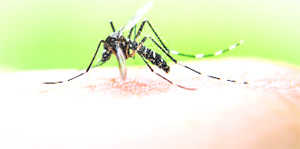
Notwithstanding 10 chikungunya-related deaths in Delhi, top experts handling the disease say there is no cause for scare. A preliminary probe into the profiles of 10 deaths in Delhi reveals they were all elderly people mostly with a history of underlying diseases like diabetes, heart disease, liver disease, kidney and lung disease. In no reported death was chikungunya viral infection the only cause.
Dr Sunit De, vice-chairman, Critical Care at Ganga Ram Hospital, which reported the first such death two days back, said: “All four patients who died at our hospital were above 60. Except one, all had a pre-existing disease. One had diabetes and two had hypertension. This is also the general profile of patients who died with chikungunya infection at Apollo and Fortis Gurgaon. In all these cases, chikungunya was a precipitating factor for death and not the only cause. When patients with co-morbid conditions get any infection, their body sometimes responds in a way which triggers shocks and multi-organ failure. For most other people, chikungunya is not fatal.”
Senior Central government doctors who briefed Health Minister JP Nadda today also said there was no cause for alarm but suggested caution for the elderly sub-group with a past disease history. Nadda later asked the Delhi Government for a detailed report on the deceased.
Dr AK Gadpayle, Medical Superintendent, Ram Manohar Lohia Hospital, told The Tribune: “Chikungunya is not life threatening at all. It causes temporary disability and fever and can be treated with paracetamol and fluid intake. There is no existing literature to suggest even an isolated chikungunya death. Prevention lies in vector control.”
In Delhi for example, the vector (mosquito)-control programme has suffered this time due to lack of coordination between the Arvind Kejriwal-led AAP government and the municipal authorities dominated by the BJP. Although questions are now being raised on Kejriwal’s absence from Delhi (he’s camping in poll-bound Punjab), the problem is the failure of Delhi’s civic agencies and the state government to eliminate mosquito breeding sites after the first central advisory to states was issued in January.
Bickering between Kejriwal and the Delhi L-G has created another challenge with L-G recently allowing the Delhi Health Secretary to go on leave as the capital reeled under a vector crisis. Now, the Health Ministry needs to coordinate on chikungunya with the Delhi Chief Secretary as the state Health Secretary is away.
Doctors say the state governments must work to address mosquito breeding in advance considering dengue and chikungunya strike between August and October every year, coinciding with the monsoon. “We don’t have a preventive mindset and then we blame hospitals,” a doctor says.
Another challenge is patients’s ignorance. Safdarjung Hospital MS Anil Rai says, “Often patients don’t know they are diabetic till they reach an ICU.”
Chikungunya testing is also posing issues this season. In a note to the Delhi Government, Ganga Ram Hospital said many patients with clinical symptoms of chikungunya tested negative through the recommended serology test, leading to deterioration in their condition. “Since September 1, we have started conducting molecular rapid tests using patient’s blood and have found 56 pc of all samples testing positive for chikungunya. So treatment is now starting early,” Gangaram says.
Experts feel chikungunya deaths (10) have outnumbered dengue deaths (four) in Delhi for the first time due to viral mutation even though both infections are caused by the same mosquito. Why this has happened is a matter of research.
Meanwhile, Nadda today spoke to Delhi Health Minister Satyender Jain assuring him help. He also reviewed the preparedness of Central Government hospitals in Delhi saying they were ready and no patient was being turned away.
